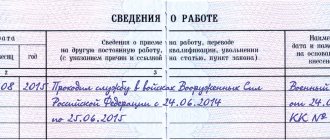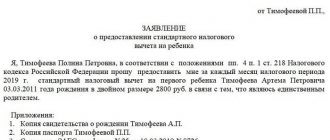How to hire a disabled person
Employers hire people with disabilities on a voluntary basis. But the state had to somehow guarantee such citizens the opportunity to find employment, and therefore some legal entities are obliged to hire disabled people to the company within the limits of the number of employees approved by law.
Such enterprises are those that have a staff of more than one hundred people. For them, a quota has been established at the legislative level to attract unemployed disabled people to work in the amount of from 2 employees to 4% of the average number of employees. For example, the quota for hiring disabled people in Moscow and the Moscow Region is 2% of the average number of employees.
It is not enough to hire a person with disabilities; it is also necessary to create conditions for him to perform his job duties. The conditions may be different - it all depends on the nature of the person’s illness and the rehabilitation program. Administrative liability is provided for all legal entities that neglect this requirement.
The amount of the fine for refusing to hire a disabled person or create the necessary working conditions is 5-10 thousand rubles.
Employment quota
Those employers with more than 100 employees are required to comply with the quota for hiring disabled people. The quota must be observed as follows: employers are required to hire 2-4% of disabled people and citizens with disabilities from the average number of employees.
At the same time, the employer does not have the right to provide such employees with places that suggest that work activity is associated with harmful and dangerous conditions.
Important! Each subject of the Russian Federation sets its own quota for employees depending on the total number of employees of the company.
In addition, any employer has the right to adopt its own act on quotas for disabled employees.
For each employment of a disabled person, the employer is obliged to provide information to the territorial body of the employment service. This body records the fact that employers fulfill the quota. If the employer does not find such workers on his own, he must contact the non-profit association of disabled people with a request, in response to which he will be offered candidates who meet the requirements of the vacancies.
Important! The employer is obliged to comply with legal requirements for hiring disabled employees. Otherwise, the employer may be subject to administrative liability.
Labor relations with disabled employees
Employees with disabilities have the right to claim benefits, and the employer is obliged to comply with them: (click to expand)
- there is no probationary period for them;
- the employment contract can be terminated early at the will of the disabled person;
- a disabled employee has the right to go on unpaid leave (60 days for disabled people of the 1st and 2nd groups, 30 days for the 3rd group);
- if an employee’s disability was acquired as a result of being in a dangerous zone during the Chernobyl disaster, he is also entitled to additional paid rest (2 weeks);
- annual leave can be taken at any time, regardless of the vacation schedule;
- involvement in work at night and after hours can only be carried out with the consent of the employee;
- disabled people have the right to work part-time shifts and part-time weeks.
Providing benefits for companies
Institutions with disabled people working in them have the right to count on specific benefits. However, the system for assigning them is very difficult.
Basically, employers who employ persons with disabled status in their organizations are provided with tax benefits. Mitigation in taxation is a kind of state support for socially vulnerable citizens. The enterprise carries out important social work - allocating funding for this.
The company also receives a relaxation on insurance premiums.
By providing all kinds of concessions and guarantees for companies employing citizens with disabilities, the state pursues the goal of providing such persons with jobs.
Pension contributions and contributions to the Social Insurance Fund
From 2012 to 2014, insurance premium rates were reduced for employers who hired people with an established disability group (with an established disability group of I, II or III). But as of 2020, they are no longer in effect, and therefore pension and other contributions are made for such employees in the general manner.
| Insurance premiums | Rate |
| Pension (in the Federal Tax Service) | 22% (from the amount of accruals within the approved maximum base value) 10% (from the amount by which the maximum base is exceeded) |
| Medical (in FFOMS) | 5,1% |
| For periods of incapacity and maternity | 2,9% (from the amount of accruals within the maximum base) 0% (from the amount by which the maximum insurance base is exceeded) |
Is it possible for disabled people of group 1 to work?
Often disabled citizens ask whether they can hire a disabled person of category 1. It should be taken into account that until 2012 the following division of persons with disabilities was used:
- persons classified as disability group 3 could always work;
- Category 1 and 2 are divided into working and non-working.
Since 2012, this distinction has been abolished. In their place came contraindications in the IPR. This term should be understood as individual rehabilitation programs. In addition, the employer has the responsibility to provide the necessary conditions for activities.
If, when carrying out verification activities regarding the health of a particular person, the commission comes to the conclusion that the citizen can no longer work, then he is assigned the 3rd degree of inability to work. However, in this case it also cannot be categorically stated that the person will not be able to perform the functions under any circumstances.
Legislative acts do not contain a direct prohibition that a person with category 1 disability cannot work. For this reason, if a person has the right to do some work, then there are no obstacles to this.
Accident insurance premiums
Insurance contributions for insurance against accidents during the working day and diseases associated with the performance of job duties are made by the heads of organizations in relation to disabled employees of groups 1, 2 and 3 at the rate:
- 60% of the tariff approved by law for the general case (both for LLC and individual entrepreneur).
For example, if the tariff for a company is approved at 0.6%, then for disabled employees the company will pay contributions at a tariff equal to 0.36%, that is, 0.6% x 60%.
What to do if a disabled person does not provide IPR
An individual rehabilitation program is mandatory for the employer, but not for the employee himself. A disabled employee has the right to refuse it at any time. In this case, the employer is not responsible for its failure to comply. At the same time, such a refusal does not entail the termination of benefits for disabled people established by labor legislation, since it does not cancel the very fact of disability. Therefore, the employee, even if he refuses the rehabilitation program, should be given a shortened day and provided with other benefits provided for by law.
Moreover, if an employee is transferred to a lower-paid job, within a month from the date of transfer he must retain his average earnings from his previous job. If the transfer is due to the fact that the employee has suffered injury or an occupational disease, then the average salary is retained until the employee recovers or doctors determine his disability. This procedure is established in Article 182 of the Labor Code of the Russian Federation.
27 Jul 2020 yslygiur 4625
Share this post
- Related Posts
- The receipt is written in how many copies?
- Sample of filling out a memo
- Lease of land in specially protected areas and facilities
- Deadlines for issuing a certificate of employment
Legislative acts on the topic
| Law | Name |
| Art. 2 of the Federal Law of December 14, 2015 No. 362-FZ | On tariffs for payment of insurance premiums against accidents and occupational diseases paid for disabled employees |
| Federal Law of December 22, 2005 No. 179-FZ | Tariffs for insurance premiums for compulsory social insurance against industrial accidents and occupational diseases |
| pp. 3 clause 1, clause 2 art. 58 of the Federal Law of July 24, 2009 No. 212-FZ | On reduced tariffs for insurance premiums for disabled people 2012-2014. |
| Art. 92 Labor Code of the Russian Federation | On the length of the working week for a disabled person: no more than 35 hours |
| Art. 5.42 Code of Administrative Offenses of the Russian Federation | Fines for refusal to hire people with disabilities within established quotas |
Medical and social examination
Info
Then the organization’s actions depend on the period for which, in accordance with the medical report, the employee needs to be transferred to another job. If an employee requires a temporary transfer for a period of up to four months, then suspend him from work for the entire period specified in the medical report.
At the same time, the employee must retain his place of work (position).
Do not accrue wages or other social benefits for this period, unless otherwise provided by the labor (collective) agreement or legislation (for example, paragraph https://youtu.be/M550LYUZuFU
2, Article 33 of the Law of March 30, 1999 No. 52- Federal Law). This is stated in Part 2 of Article 73 of the Labor Code of the Russian Federation. If an employee needs a temporary transfer for a period of more than four months or a permanent transfer, then if he refuses the vacancy or if there are no vacancies in the organization, he must be dismissed (Part 3 of Article 73 of the Labor Code of the Russian Federation).
Typical errors in calculations
Mistake #1.
A disabled employee works a 40-hour work week.
The working week for personnel certified as having a disability group should be no more than 35 hours, and daily restrictions are set depending on the medical report. At the same time, full wages are retained.
Mistake #2.
Employer during 2016-2017 made insurance contributions for disabled workers at reduced rates.
Where can people with disabilities work?
Disability is assigned to persons who have inherited or acquired stable health difficulties of various etiologies. This can be done according to the conclusion of a medical and social expert commission. At MSEC you can also get recommendations about the position and place where such an employee can get a job.
The state does not limit citizens with disabilities regarding the choice of positions where they can be employed. When deciding this issue, in addition to the advice of MSEC, the head of the company must take into account the level of education and practical skills of this citizen. When employed, a disabled person receives benefits regarding working conditions.
When admitted to an organization, a disabled person must present:
- certificate confirming the group;
- YPRES.
Answers to common questions
Question No. 1.
Are overtime and night hours of work performed by a disabled employee specially paid?
No, standard rates for these cases apply.
Question No. 2.
What are the consequences for violating the rights of disabled employees?
Officials will be fined 1-5 thousand rubles, legal entities - 30-50 thousand rubles. Administrative punishment in the form of suspension of the company’s work for up to 90 days is also possible.
at Kontur.School: changes in legislation, features of accounting and tax accounting, reporting, salaries and personnel, cash transactions.
A disabled person is usually understood as a person who has a health disorder with a persistent disorder of body functions, caused by diseases, consequences of injuries or defects, leading to limitation of life activities and necessitating his social protection. Determination of disability is carried out by special federal institutions - the Bureau of Medical and Social Expertise.
What should an employer do if an employee becomes disabled?
In accordance with paragraph 36 of Order No. 95, a citizen recognized as disabled is issued a certificate confirming the fact of disability, indicating the disability group, as well as an individual rehabilitation program. The procedure for drawing up and the form of a certificate and an individual rehabilitation program (hereinafter referred to as the IPR) are approved by Order of the Ministry of Health and Social Development of the Russian Federation N 1031n.
Note! The decision of the establishment of a medical and social examination is mandatory for execution by the relevant government bodies, local government bodies, as well as organizations, regardless of organizational, legal forms and forms of ownership (Article 8 of Law No. 181-FZ).
How to hire a disabled employee
Companies employ people with disabilities on a voluntary basis, but for some organizations the hiring of such persons on their staff is mandatory within the limits of the quota established for them. For organizations with more than 100 employees, the legislation of the constituent entity of the Russian Federation establishes a quota for hiring disabled people as a percentage of the average number of employees (but not less than 2 and not more than 4%). Thus, the state guarantees the right to employment for people with disabilities. For example, in Moscow and the Moscow region, the quota for hiring disabled people is 2 - 4% of the average number of employees. The differentiation as a percentage depends on the average number of employees.
For refusing to hire a disabled person within the established quota, the employer may be held liable under Part 1 of Art. 5.42 of the Code of Administrative Offenses of the Russian Federation in the amount of 5,000 to 10,000 rubles.
Working conditions for disabled people are as follows:
- For disabled people of groups I and II, a reduced working time of no more than 35 hours per week is established while maintaining full wages (Article 92 of the Labor Code of the Russian Federation). Limitations on the duration of daily work (shift) for disabled people are established in a medical report, for example, in an individual rehabilitation program (Article 94 of the Labor Code of the Russian Federation).
- A disabled employee can be involved in overtime work, work on weekends and holidays and at night only with his consent and provided that such work is not prohibited for him due to health reasons. At the same time, these employees must be informed in writing of their right to refuse to work at odd hours. The employee's consent must also be obtained in writing. There are no special provisions for payment for overtime work, work on weekends, holidays and night time.
- Disabled persons are provided with extended annual paid leave; it is at least 30 calendar days. Persons who became disabled as a result of the Chernobyl disaster have the right to additional paid leave of 14 calendar days in accordance with clause 5, part 1, art. 14 of the Law on social protection of citizens exposed to radiation as a result of the disaster at the Chernobyl nuclear power plant.
- For disabled employees due to family circumstances or other valid reasons, based on a written application, the employer is obliged to provide unpaid leave for up to 60 calendar days a year (Article 128 of the Labor Code of the Russian Federation).
Violation of the rights of disabled workers entails liability in the form of an administrative fine on officials in the amount of 1,000 to 5,000 rubles; for legal entities - from 30,000 to 50,000 rubles. or administrative suspension of activities for up to 90 days (Article 5.27 of the Code of Administrative Offenses of the Russian Federation).
Is the employee obliged to provide the employer with an IPR?
IT IS FORBIDDEN! Require the employee to submit documents confirming or refuting his disability. Now let's figure out whether you are required to give the employee a description of working conditions. To do this, you should refer to Art. 62 of the Labor Code of the Russian Federation, according to which, upon a written application from an employee, the employer is obliged, no later than three working days after filing such an application, to provide the employee with copies of documents related to his work. That is, in order to receive a copy of a document related to work, the employee must contact the employer with a written application, and not verbally, as happened in your case. Summary The employer does not have the right to require the employee to submit documents confirming his disability.
Also, the legislation does not contain requirements for the mandatory provision and timing of provision of IPR by the disabled employee himself. Consequently, liability for the employer’s lack of IPR in a situation where the specified program was not provided by the disabled employee himself, or for the employee’s failure to provide IPR is also not provided for by law.
Therefore, if the employee does not provide the employer with an IPR or refuses to comply with its recommendations, the employer is obliged to comply only with the general requirements of the law regarding the working conditions of all disabled people: - establish for employees who are disabled people of group I or II a reduced working time, not exceeding 35 hours per week (part one of Article 92 of the Labor Code of the Russian Federation, part three of Article 23 of Law No. 181-FZ); - provide annual paid leave of at least 30 calendar days (part two of Art.
Insurance contributions from the wages of disabled employees
In accordance with Art. 427 of the Tax Code of the Russian Federation in 2020, a reduced tariff for organizations where disabled people work is not provided. Tariffs of insurance premiums are established by Art. 426 of the Tax Code of the Russian Federation and are:
- 22% within the established limit of the base for calculating insurance contributions for compulsory pension insurance;
- 10% above the established maximum base for calculating insurance contributions for compulsory pension insurance.
The maximum base for calculating insurance contributions to the Pension Fund in 2020 is RUB 876,000. on a cumulative basis from the beginning of the calendar year (Resolution of the Government of the Russian Federation of November 29, 2016 No. 1255, clause 3 of Article 421 of the Tax Code of the Russian Federation);
2) in the Federal Social Insurance Fund of the Russian Federation - 2.9% within the established maximum value of the base for calculating insurance contributions for compulsory social insurance for temporary disability and maternity.
The maximum base for calculating insurance premiums to the Federal Social Insurance Fund of the Russian Federation for disability and maternity is 755,000 rubles. cumulative total from the beginning of the calendar year (Resolution of the Government of the Russian Federation No. 1255). Above this amount, insurance contributions to the Social Insurance Fund of the Russian Federation are not paid (clause 3 of Article 421 of the Tax Code of the Russian Federation);
3) in the Federal Compulsory Medical Insurance Fund - 5.1%. The organization is required to pay these contributions from the entire remuneration amount, since the maximum base for calculating insurance contributions to the Federal Compulsory Medical Insurance Fund for 2020 has not been approved.
Webinars for accountants at Kontur.School: changes in legislation, features of accounting and tax accounting, reporting, salaries and personnel, cash transactions.
The employer who makes payments to its employees calculates and pays insurance premiums (Article 5, 7 of the Federal Law of July 24, 2009 No. 212-FZ, Art. 3, 20.1 of the Federal Law of July 24, 1998 No. 125-FZ). How much does an employer pay insurance premiums for payments to a disabled employee? We'll talk about this in our consultation.
Working conditions
An entrepreneur is obliged to prepare a workplace for a citizen with disabilities. For workers using a wheelchair, ramps are installed and doorways are widened. For visually impaired and hearing-impaired specialists, programs with sound recording, voice control and enlarged fonts, call buttons with light displays and other auxiliary equipment are prepared.
Working conditions under which disabled people of group 1 are prohibited from working, specified in clause 4.2. Sanitary rules:
- strong electromagnetic field in the room, presence of static electricity, irritating sound effects;
- high concentration of dust, gases, allergens, carcinogens in the working area;
- proximity to pathogenic microorganisms, high probability of contact with the remains of their vital activity;
- strong psychological stress (long monotonous work, high level of stress due to a large number of tasks, etc.);
- moving, holding heavy objects, the need to perform physical labor;
- working in an awkward position, the need for long walking, for example, from one workshop to another.
According to this regulatory act, the employer must create comfortable working conditions, ensure the protection of disabled workers from noise, vibration, temperature changes, high air mobility caused by the operation of industrial equipment, and other unfavorable factors. Entrepreneurs are required to employ persons with disabilities. Benefits for employers when employing disabled people:
- 100% discount on income tax.
- 100% discount on payment of land and property duties.
- Reduction of the insurance rate for the Social Insurance Fund by 2.4%.
- 3.7% discount when paying premiums for compulsory health insurance.
- Compensation for additional costs for creating a workplace for a citizen with the first group of disabilities - up to 100,000 rubles.
- 10 advantages of old age that not everyone knows about
- Which household services moved online during quarantine?
- Benefits for military veterans - a complete list of taxes and services
According to the current legislation of the Russian Federation, a person with partial working ability is not limited in the choice of professions, but the following vacancies are closed for disabled people of group 1:
- work in the Ministry of Internal Affairs, Ministry of Emergency Situations, law enforcement agencies, directly related to the professional activities of these services;
- miner, mechanic;
- work in chemical plants, steel smelting shops.
Not all entrepreneurs can be recruited to hire people with disabilities. According to Federal Law No. 181-FZ of November 24, 1995, enterprises with a staff of 35 people or more are required to hire citizens with disabilities. The procedure for distributing quotas:
- with a staff of 35 to 100 people, up to 3% of employees are disabled;
- with a staff of more than 100 people, up to 4% of the total number of employees are disabled.
If there is a shortage of disabled people, the entrepreneur will be held administratively liable. He will be fined 5,000-10,000 rubles. Companies in which 80% of the staff are disabled people receive additional preferences. They are fully exempt from VAT when collaborating with companies funded by disability communities.
Individual rehabilitation program
Based on the results of the medical and social examination, the disabled person is issued several documents. One of them is an individual rehabilitation program (IRP). The document contains a description of medical and social measures necessary to improve the patient’s condition. Sections describing reconstructive surgery are also added there.
Specifically, the employer needs to study the sections of the IPR, which discuss the conditions for carrying out work activities, the restrictions in force for a disabled person and the means of technical rehabilitation. Some of the additional devices specified in the program are provided by the entrepreneur to the employee for the duration of his work.
The employer is obliged to familiarize himself with the individual rehabilitation program and follow all the recommendations specified in it. In case of systematic violations of the IPR requirements, the entrepreneur will be fined (up to 300,000 rubles) and deprived of benefits provided when hiring persons with disabilities. Working from home for a group 1 disabled person imposes fewer obligations on the employer. Necessary:
- provide payments to the employee on time;
- arrange leave at the request of a disabled person;
- make contributions for the employee to the Pension Fund, Social Insurance Fund.
Conditions for releasing an employer from liability for failure to comply with IPR requirements
An enterprise that employs a disabled person is not responsible for compliance with the standards of an individual rehabilitation program if:
- the disabled person submitted a written refusal to submit an IPR;
- the document does not contain or clearly describes the clause on incapacity for work;
- the disabled person submitted a written statement refusing the special working conditions described in the IPR.
- Reasons why your urine smells bad
- Lamb kebab
- Potatoes with chanterelles in a frying pan
Contributions to the Pension Fund and Social Insurance Fund
For employers making payments and other remuneration to individuals who are disabled people of groups I, II or III, in 2012-2014. reduced insurance premium rates were in effect (clause 3, clause 1, clause 2, article 58 of the Federal Law of July 24, 2009 No. 212-FZ). From 01/01/2015, reduced insurance premium rates for payments to disabled employees are not applied, which means that such payments are subject to insurance contributions to the Pension Fund of the Russian Federation and the Social Insurance Fund on general terms.
In 2020, the general rates of insurance premiums for payments to employees, including disabled employees, are as follows:
"Unfortunate" contributions
Insurance premiums for compulsory social insurance against industrial accidents and occupational diseases are paid by policyholders in the manner and at the rates established by Federal Law No. 179-FZ of December 22, 2005.
At the same time, Article 2 of the said Federal Law establishes that insurers-organizations apply a tariff of 60% of that established by the Law to payments to employees who are disabled people of groups I, II and III. Similarly, a discount to the basic tariff of 40% can also be applied by employers-entrepreneurs (Article 2 of the Federal Law of December 14, 2015 No. 362-FZ). For example, the rate of contributions for “injuries” for an organization is set at 0.6%. Then, in relation to payments to disabled employees, the policyholder will apply this tariff in the amount of 0.36% (0.6% * 60%).
Insurance premium rates for injuries in 2020 will remain unchanged. The draft law “On insurance tariffs for compulsory social insurance against industrial accidents and occupational diseases for 2020 and for the planning period of 2018 and 2020” has been approved by the Government of Russia. According to the new law, the tariffs in force in 2020 will remain in place in 2017.
In 2020, insurance premiums for “injuries” will need to be paid in the manner and at the rates established by Federal Law No. 179-FZ of December 22, 2005. This law stipulates that insurance premium rates range from 0.2% to 8.5% of the amounts of payments and other remuneration in favor of those insured within the framework of labor relations and civil contracts.
In 2020, benefits will also remain for entrepreneurs who pay contributions for disabled people of groups I, II and III. In this case, individual entrepreneurs pay contributions in the amount of 60% of generally established insurance rates.
Note that these benefits are already planned to be extended from 2018-2019. On the website of the Government of the Russian Federation about.
It is also planned to extend the validity of these tariffs for 2018-2019.
Insurance premium rates for injuries in 2020, as before, will be determined in accordance with the class of professional risk. It, in turn, depends on the main type of business activity specified in the Unified State Register of Legal Entities or Unified State Register of Entrepreneurs.
IPR of a disabled person
To protect the authorized rights of the applicant Lidiya Ivanovna Solovyeva, born July 27, 1930, to provide comprehensive assistance in sending an examination to the ITU for the development and formation of an individual program, assessing the degree of expression of each parameter. (referral form ITU No. 088/U-97, attach to the referral the necessary extracts, conclusions on the treatment, rehabilitation, etc.), to obtain an IPRA (as established by Article 11 of the Federal Law of the Russian Federation No. 181 of November 24, 1995, for each a rehabilitation or habilitation program (abbreviated as IPR or, respectively, IPRA) is personally developed for the disabled person. In November-December 2020, we contacted the Policy located at St. Petersburg, st. Malaya Desyatinnaya, 11-1, letter A, to the general practitioner Ablikova M.P. with a request to send our documents for registration of IPRA to Solovyova L.I., born 07/27/1930, who lives with us at the actual address: 197375, Russia, St. Petersburg. In January-February 2020, 4 (four) representatives from ITU arrived, stayed for about 15 minutes, photographed the grandmother, looked at the documents, took photographs - examined Solovyova L.I., born July 27, 1930, they said that you need everything and As stated in the TSR, all questions should be directed to your doctor, who will give you an IPRA - where everything will be indicated. In February-March 2020, general practitioner M.P. Ablikova called and said that we needed to bring her the missing documents. We meet all the requirements of doctor Ablikova M.P. completed, at the reception when we brought a package of documents, she told us that she had looked at everything and said that we were not entitled to anything. We asked the question: can we pick up the original IPRA of Lidiya Ivanovna Solovyova, born July 27, 1930, the doctor tells us why we need it, for us this question has become a dead end, like why to issue TSR, etc.. In response, doctor M. Ablikova .P. informs where you were before since all the deadlines have passed, we inform her and you informed us about your readiness and where is the original IPRA. The doctor said that we would have to do everything again. We ask her why, if on our part we provided all the documents on time as you asked us. After all, you, as a doctor, are obliged to help us in consultation, provide assistance and support in the preparation of IPRA, give recommendations, etc. We assess the actions of the doctor Ablikova M.P. as a negligent attitude towards her official duties, who considered herself to have the right to deprive the unconditional property and legal privileges of a person - an elderly person over 89 years old, Lidiya Ivanovna Solovyeva, born July 23, 1930, Veteran Great Patriotic War, Veteran of Labor, awarded orders and medals of the USSR for selfless work and impeccable military service in the rear and the years of the Great Patriotic War, Disabled person of the second group, indefinite, issued in 2004. We ask you to look into our issue, restore all deadlines for completing the IPR for Solovyova L.I., and provide assistance in obtaining TSR. Implementation of obtaining a full range of measures, which includes all the mandatory components of rehabilitation (technical means, services, restoration measures), for Lidia Ivanovna Solovyeva, born July 27, 1930, to create a disability, free, unhindered access to all infrastructure facilities. With the possible elimination of existing disabilities or their compensation. Restoration of previously lost, partially impaired functions, compensation, return of abilities to carry out specific activities to maintain a decent life and improve its quality. -adaptation of a disabled person to life in society; -compliance with health rehabilitation measures; - assistance in gaining social independence. The goal is to increase the overall tone of the body, strengthen the immune system, return to normal life without outside help, restore health, return to society, and solve psychological problems. All this will help to completely remove the restrictions caused by the illness of Lidiya Ivanovna Solovyova, born July 23, 1930. – which deserves it – should be provided with free TSR. Providing documents for obtaining free TSR, namely: 1. Certificate of a Great Patriotic War Veteran Series BB No. 5455914 dated March 17, 2004, issued by the Department of Social Protection of the Petrograd District of St. Petersburg; 2. Certificate of Labor Veteran Series K No. 378528 dated April 3, 2006, issued by the Vladimir region administration; 3. Certificate Series T No. 798015 dated January 05, 2001, issued by the Social Security Committee. protection of the population of the lake. Kalchugin on awarding orders and medals of the USSR for selfless work and impeccable military service in the rear and the years of the Great Patriotic War; 4. Certificate series ITU-2004 No. 2800754 dated September 21, 2004, issued by the St. Petersburg Bureau of ITU, 46 - disability group second - unlimited; 5. Certificate No. 034073 dated September 13, 1985 - Living in 197375, Russia, St. Petersburg,
Lidiya Ivanovna Solovyova, born July 27, 1930, be issued an IPRA after passing the ITU (form 088/u-97). The effect of the developed program extends to the period for which the permanent disability group is established. The IPR form (IPRA) has been approved and presented in appendix. 2 to Order of the Ministry of Labor of the Russian Federation No. 486n dated June 13, 2017 (as amended in 2020). The IPRA is assigned a registration number, which includes: serial number of the IPR, bureau number, code of the subject of the Russian Federation, year of development of the IPR. The prepared finished program must bear the signature of the head of the ITU bureau with a transcript and the bureau’s seal. In relation to Lidiya Ivanovna Solovyova, born July 27, 1930, measures must be taken, procedures are spelled out with exact deadlines for implementation, responsible persons, institutions, and the required volume of rehabilitation measures. Fill out the IPRA according to a single form developed by officials and then approved by Order No. 287. Registration of an individual pension for those limited due to health conditions opens up a number of additional opportunities and provides social guarantees from the state. Having an individual rehabilitation card in hand, Lidiya Ivanovna Solovyeva, born July 27, 1930, can count on quality help. — An individual rehabilitation program for a disabled person of group 2, group 1 and 3, is drawn up within a month after receiving disability or from the date of filing the application. Provide the IPRA for careful study of all sections, familiarization with the proposed measures for subsequent decision-making, or sign or appeal, indicate the reason for disagreement (by signing, the owner of the IPRA agrees with the proposed list of measures, necessary means, other procedures), legal or authorized representative of the disabled person (child -disabled person) has the right to appeal this decision in the manner prescribed by the Rules for recognizing a person as a disabled person, approved by Decree of the Government of the Russian Federation of February 20, 2006 No. 95 “On the procedure and conditions for recognizing a person as a disabled person” (Collected Legislation of the Russian Federation, 2006, No. 9, Art. 1018; 2008, No. 15, Art. 1554; 2010, No. 2, Art. 184; 2012, No. 7, Art. 870; No. 17, Art. 1992; No. 37, Art. 5002; 2020, No. 33, Art. 4836; 2016, No. 35, Art. 5320). The design features of the IPRA are described in more detail in the notes to the form. Everything that is stated in it is provided to the disabled person free of charge. Instructions, activities, services prescribed in the IPRA are subject to unconditional execution. The performers in this case are all organizations that are involved in the rehabilitation of a disabled person. These include: medical institutions, employment services, relevant social services, educational institutions, social protection authorities. A disabled person who has been issued an IPRA has the right to independently contact these organizations for advice and the necessary assistance. All implementing organizations bear full responsibility for the proper implementation of the IPRA. None of them has the right to change the rehabilitation program, reduce the amount of activities required for a disabled person, or replace them with something else. As established, within 2 months. Before the expiration of the period for which disability is established, they prepare and submit the necessary reports on the rehabilitation measures taken. Federal Law of the Russian Federation No. 181 dated November 24, 1995 pays significant attention to issues of rehabilitation and recovery of disabled people. As noted in Art. 9 Federal Law of the Russian Federation No. 181, rehabilitation of a disabled person is a mandatory systemic process aimed at restoring his abilities for various types of activities (domestic, labor, social, etc.). The main objective of this process is the elimination or, at least, the maximum possible compensation of the existing limitations in the life activity of Lidiya Ivanovna Solovyova, born July 27, 1930. Social adaptation is an indispensable component of rehabilitation. In this regard, the state for disabled people at the expense of the federal budget: -provides the necessary technical equipment. facilities; -provides related services; -carries out assigned recovery measures. The entire range of designated measures is included in the federal list approved by Government Order No. 2347-r on December 30, 2005 (as amended in 2017). At the moment, the list introduced by Order No. 2347-r in the latest edition dated November 18, 2017 is used. Accordingly, the following data from the list is relevant for 2020. Those. funds from budget funds to be provided to Lidia Ivanovna Solovyeva, born July 27, 1930. Federal list of TSR, established by Government Decree No. 877 dated December 31, 2005, Federation dated December 30, 2005 No. 2347-r (as amended on November 18, 2017), Classification of TSR within the Federal List (modification) approved by Order of the Ministry of Labor of Russia dated February 13, 2018 No. 86n .: •support and tactile canes, walkers; • manual wheelchairs (active type) - with the right to choose a comfortable model, a suitable size for yourself. Since an active stroller is such an individual product, there is no need for individual selection and adjustment to a person’s specific needs. with increased load capacity of the PREMIUM configuration, individual adjustment of the wheelbase; •anti-bedsore tubular mattress and pillow; •devices for dressing, undressing and grasping objects; •special clothing; •orthopedic shoes; •special devices for reading “talking books”, for optical correction of low vision; •medical thermometers and tonometers with speech output; •light and vibration sound alarms; •TVs with teletext for receiving programs with closed captions; •telephone devices with text output; •voice-forming apparatus; •special means for violations of excretory functions (urine and colostomy bags); •absorbent linen, diapers, sheets, absorbent diapers; •chairs with sanitary equipment and folding armrests; •body care products (hair gel, body wash foam, hair shampoo; •Braille display, screen access software; •exercise machine for the upper and lower parts of the body, exercise bike; •prostheses and orthoses; •hearing aids, including including with custom-made ear plugs. Regional list of DTSD in accordance with Chapter 10 “Social support for people with disabilities” of the Law of St. Petersburg dated November 9, 2011 No. 728-132 “Social Code of St. Petersburg” and the Decree of the Government of St. Petersburg dated July 21, 2015 No. 649 “On measures to implement Chapter 10 “Social support for people with disabilities” of the Law of St. Petersburg “Social Code of St. Petersburg”: •functional medical bed with a mechanical regulation drive, a device for lifting and pulling, side rails, a shelf for a vessel, a quick-release bracket for a tripod with a dropper; •telescopic ramps; •folding bath; •seats for a bath or shower, auxiliary steps with a handle; •anti-slip mats for baths and showers, steel handrails; •toilet seats (toilet seats); •devices for writing in Braille; •special paper sheets; •slates for writing in raised dot font; •wristwatch with speech synthesizer for people with visual impairments; •watches with indication for people with visual impairments (Braille wristwatches); •alarm clocks with speech synthesizer for people with visual impairments; •devices for measuring blood sugar levels with speech output; •standing supports for disabled people over 18 years of age; •medical rehabilitation products (medicines, surgical interventions); •providing a place for sanatorium-resort treatment (a trip to a Russian sanatorium with an accompanying person); • provision of special transport services (social taxi) - Citizens over 80 years of age with disability group II (clause 7, clause 1, article 83), Disabled people of the Great Patriotic War with disability group II (clause 8, clause. 1 article 83); •providing free medicine according to available benefits; • vocational guidance; • prosthetics; • training for disabled people.
Appendix: 1. Original application from the Head of POLIS; 2. Original application from the Federal State Institution Bureau of Medical and Social Expertise of the Primorsky District of St. Petersburg; 3. A copy of the certificate of a Great Patriotic War Veteran, Series BB No. 5455914 dated March 17, 2004, issued by the Department of Social Protection of the Population of the Petrogradsky District of St. Petersburg; 4. A copy of the Veteran of Labor certificate Series K No. 378528 dated April 3, 2006, issued by the Vladimir region administration; 5. A copy of the certificate Series T No. 798015 dated January 05, 2001, issued by the Social Security Committee. protection of the population of the lake. Kalchugin on awarding orders and medals of the USSR for selfless work and impeccable military service in the rear and the years of the Great Patriotic War; 6. Copy of certificate series ITU-2004 No. 2800754 dated September 21, 2004, issued by the St. Petersburg Bureau of ITU, 46 - disability group second - unlimited; 7. Copy of certificate No. 034073 dated September 13, 1985; 8. Copy of passport for Ms. Solovyova L.I.; 9. A copy of the medical policy and SNILS of Solovyova L.I.; 10. Copies of the conclusion attachment.
I ask you: 1. To call in advance about the arrival of ITU specialists for registration of IPR, indicating a clear date and time, to the applicant’s representative: Evgeniy Nikolaevich Solovyov, tel. +79602834671, E-mail.; 2. Conscientiously study the medical record of Lidiya Ivanovna Solovyeva, born July 27, 1930, take into account the recommendations in the application, issue expert opinions or recommendations from specialists for examination at the ITU to the person who has formed the individual program and explain where to go to complete it. Complete the IPR no later than one month from the date of submission of the written application. In accordance with the Decree of the Government of the Russian Federation of August 13, 1996 No. 965, ITU bodies are required to develop an IPR for each disabled person; 3.Provide consultation and clarification from ITU specialists on the preparation of IPR; 4. Inform about the progress and completion of the IPR; 5. Provide the completed IPRA according to a unified form developed by officials and then approved by Order No. 287. Registration of an individual pension for those limited due to health conditions opens up a number of additional opportunities and provides social guarantees from the state. (The IPR form (IPRA) is approved and presented in Appendix 2 to Order of the Ministry of Labor of the Russian Federation No. 486n dated June 13, 2017 (as amended in 2020). The IPR is assigned a registration number, which includes: serial number of the IPR, bureau number, code of the subject of the Russian Federation , year of development of the IPR. The prepared finished program must bear the signature of the head of the ITU bureau with a transcript and the seal of the bureau. 6. In relation to Lidiya Ivanovna Solovyeva, born 07/27/1930, carry out activities, procedures that specify the exact implementation deadlines, responsible persons, institution, the required volumes of rehabilitation measures. 7. BMSE specialists should not be offered to sign a refusal to draw up an individual rehabilitation program, citing this step as inexpediency, ineffectiveness of rehabilitation or the lack of technical means, services, material resources necessary for the implementation of the IPR. Such a requirement from the ITU bodies is illegal 8. Restore the deadlines for passing the ITU in obtaining IPRA, provide prompt assistance in obtaining TSR according to the required list (technical funds from budget funds to be provided to Lidia Ivanovna Solovyeva, born July 27, 1930. Federal list of TSR, established by Government Decree No. 877 dated December 31, 2005, Federation dated December 30, 2005 No. 2347-r (as amended on November 18, 2017), Classification of TSR within the Federal List (modification) approved by Order of the Ministry of Labor of Russia dated February 13, 2018 No. 86n ., Regional list of DTSD in accordance with Chapter 10 “Social support for people with disabilities” of the Law of St. Petersburg dated November 9, 2011 No. 728-132 “Social Code of St. Petersburg” and the Decree of the Government of St. Petersburg dated July 21, 2015 No. 649 “On measures for implementation of Chapter 10 “Social support for people with disabilities” of the Law of St. Petersburg “Social Code of St. Petersburg”.
Insurance premium rates for injuries in 2020: table
| Occupational risk class | Rate |
| I | 0,2 |
| II | 0,3 |
| III | 0,4 |
| IV | 0,5 |
| V | 0,6 |
| VI | 0,7 |
| VII | 0,8 |
| VIII | 0,9 |
| IX | 1 |
| X | 1,1 |
| XI | 1,2 |
| XII | 1,3 |
| XII | 1,4 |
| XIV | 1,5 |
| XV | 1,7 |
| XVI | 1,9 |
| XVII | 2,1 |
| XVIII | 2,3 |
| XIX | 2,5 |
| XX | 2,8 |
| XXI | 3,1 |
| XXII | 3,4 |
| XXIII | 3,7 |
| XXIV | 4,1 |
| XXV | 4,5 |
| XXVI | 5 |
| XXVII | 5,5 |
| XXVIII | 6,1 |
| XXIX | 6,7 |
| XXX | 7,4 |
| XXXI | 8,1 |
| XXXII | 8,5 |
Contributions for injuries are funds sent through the Social Insurance Fund to an employee as compensation for harm to health caused in the performance of their work functions.
The employer is obliged to accrue a certain amount monthly in relation to the labor income received by the subordinate. It is influenced by many factors, including:
- availability of benefits on insurance premiums for injuries;
- Kind of activity;
- approved tariffs for insurance premiums for injuries.
Despite the transfer of the bulk of contributions to tax authorities, in 2019 the FSS continues to oversee the contributions in question. Therefore, there are some changes.
Let us recall that the features and rules for deductions for injuries are regulated by Law of 1998 No. 125-FZ.
What object of taxation
The deductions under consideration are made provided that the employee has concluded:
- employment contract (always);
- civil contract (when such a condition is stipulated).
The employer deducts from
insurance premiums for injuries in 2020, regardless of whether subordinates have citizenship of our country.
Within the framework of the relationship under consideration, the insurer is the Social Insurance Fund, and the policyholder is:
- legal entities (regardless of the type of ownership);
- owner of his own business;
- an individual who has signed an employment agreement with another person.
Deductions to the Social Insurance Fund for injuries come from different types of income: salaries, allowances, bonuses, compensation for unclaimed leave, as well as when paying wages in products. Exceptions to taxation for injuries are:
- government benefits;
- payments due upon liquidation of an enterprise or reduction of personnel;
- funds received for work in particularly difficult or hazardous conditions;
- material assistance provided in the event of force majeure;
- fees for completing training or advanced training courses, etc.
Methods for dismissing an employee due to disability
After an employee has been recognized as having serious health problems that prevent him from working at his previous place of work, various dismissal options are used.
Attention
Since a disabled employee still remains a citizen of Russia, he is subject to all dismissal options possible for a healthy person.
The employer, if possible, may offer another position with easier working conditions. The employee must be offered all available positions at the enterprise with suitable working conditions. If an organization has a branch network distributed over different regions, then, depending on the content of the employment contract, the citizen may be offered work in another area.
Important
The citizen decides whether to agree to an alternative position or not; pressure in this case is inappropriate.
At your own request
An employee has the right to write a letter of resignation at his own request. In this case, the dismissal procedure does not differ from the standard one. The issue of working out will be resolved on an individual basis. If an employee is unable to even nominally perform his job duties, he may be exempt from working. In this case, the citizen is not entitled to additional severance pay.
Employer initiative
If a citizen does not want to leave his job, but cannot perform his job duties, he can be fired at the initiative of the employer. There are several options for releasing an employee from a position.
Dismissal due to inadequacy of the position held. In this case, the employee must be certified, during which his inability to cope with job tasks is revealed. After the conclusion of the certification commission, a dismissal order is issued.
If it has been proven that an employee has committed a criminal, administrative or disciplinary offense, he can also be dismissed at the initiative of the employer, despite his existing disability. Appearing at the workplace under the influence of alcohol or drugs is a reason to fire an employee.
Attention
If the enterprise is completely liquidated, the disabled person will be dismissed on a general basis.
If there is a reduction in staff or reorganization, then the law secures some rights and benefits for people with disabilities and they are likely to retain their place. If an employee is dismissed on this basis, he has the right to compensation in the amount of average monthly income for two months.
Agreement of the parties
Another option for dismissal is by agreement of the parties. In this case, the amount of compensation paid to the employee must be agreed upon and fixed in a written agreement. Otherwise, the employee cannot claim any benefits.
Circumstances beyond the control of the parties
For medical reasons. In this case, dismissal is carried out in the presence of a medical report that describes the current condition of the patient and a rehabilitation program that does not provide for work activity, even in the future. Upon dismissal for medical reasons, a citizen is entitled to a benefit in the amount of two weeks' average earnings. Since the benefit, in its essence, is a compensation payment and not earned income, personal income tax is not withheld from it.
What are the rates for insurance premiums for injuries?
The rate for insurance of employees against accidents and occupational illnesses related to production activities is set in the range of 0.2 – 8.5%. It increases in proportion to the increase in the degree of risk to which the main activity of the enterprise is assigned. All these parameters are established by law.
In total, there are 32 tariffs, formed taking into account different areas of activity (Article 1 of Law No. 179-FZ of 2005). They characterize different degrees of risk and the corresponding percentage of contributions. Tariffs for insurance premiums for injuries in force in 2019 are presented in the table below (in %).
The class to which the activity of an enterprise belongs can be determined using two regulatory documents:
- OKVED;
- Classification of activities by risk (approved by order of the Ministry of Labor No. 625-n).
This information is reflected in the registration documents received when applying to the FSS.
How much to transfer
Employers must calculate personal injury insurance premiums monthly in 2020
, taking into account accruals for the past 30 (31) days. This can be done using the formula:
FEE = B x TARIFF
Where:
B
– base for contributions for injuries. This is the amount of money received by the employee, on the basis of which the required value is calculated. The legislation does not provide for any restrictions on the amount. The calculation is made as follows:
B = Payments td/gpd – Payments n/a
Where:
Payments td/gpd
– funds paid to an individual in accordance with an employment (civil) contract.
Payments n/a
– non-contributory payments.
On a note:
when settlements with a person are made in kind, contributions are calculated for the amount of money specified in the agreement. VAT and excise taxes are also taken into account.
EXAMPLE
The travel agency "Prestige" offers vacationers excursion tickets, as well as places to stay and vehicles. OKVED – 63.30.2. In February 2020, employees were paid a salary in the total amount of 3 million 500 thousand rubles, including financial assistance of 32 thousand rubles. Determine the amount of insurance contributions to the Social Insurance Fund.
New data for discounts and allowances in 2019
Employers make “injury” contributions in accordance with insurance rates. However, a discount or surcharge may be applied to the tariff (clause 1, article 22 of the Federal Law of July 24, 1998 No. 125-FZ).
The size of the discount (surcharge) is determined by a formula that involves three indicators:
- The ratio of the Social Insurance Fund's expenses for the payment of benefits for all insured events for the policyholder and the total amount of accrued contributions;
- Number of insured events per thousand employees;
- The number of days of temporary disability for the policyholder per insured event (excluding cases of death).
The average values of these indicators by type of economic activity for 2020 were approved by Resolution of the Federal Tax Service of the Russian Federation dated May 31, 2017 No. 67. For example, for retail trade in food products, drinks and tobacco products in specialized stores, the indicated values are 0.07, 0.46 and 48.67, respectively .











